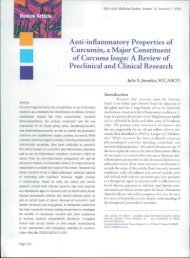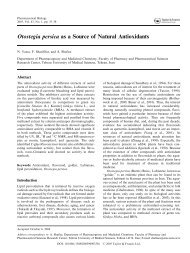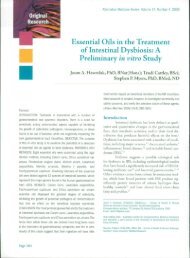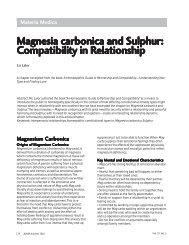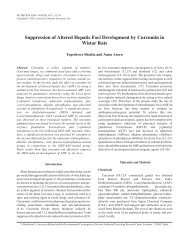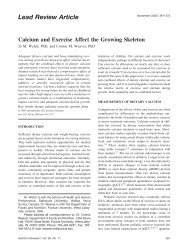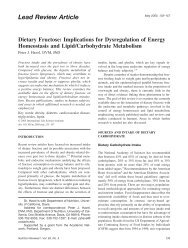Untitled
Untitled
Untitled
Create successful ePaper yourself
Turn your PDF publications into a flip-book with our unique Google optimized e-Paper software.
men improves metabolic syndrome indicators and<br />
cardiovascular risk factors. Maintaining testosterone<br />
concentrations in the normal range has been<br />
shown to contribute to bone health, lean muscle<br />
mass, and physical and sexual function, suggesting<br />
that testosterone replacement therapy may<br />
help to prevent frailty in older men. Based on<br />
current knowledge, testosterone replacement<br />
therapy is unlikely to pose major health risks in<br />
patients without prostate cancer and may offer<br />
substantial health henefíts."<br />
Testosterone and Cardiovascular Health<br />
Let's take a closer look at what the medical<br />
literature says about the specific benefits of testosterone<br />
restoration. Many studies have shown an association<br />
between low testosterone levels and a higher<br />
prevalence of coronary artery disease**'" and aortic atherosclerosis.'"<br />
Lower testosterone levels are also associated<br />
with reduced pumping ability of the heart.''<br />
Recent studies suggest that testosterone-replacement<br />
may improve the symptoms of coronary artery<br />
disease. A placebo-controlled crossover study in men<br />
with ischémie heart disease and low testosterone<br />
levels reported that exercise time and the time to<br />
development of ischémie changes on a treadmill test<br />
were both increased with testosterone-replacement<br />
therapy." Another placebo-controlled study found<br />
that 12 weeks of oral testosterone-replacement therapy<br />
improved the ability of the brachial artery to dilate<br />
in men with coronary artery disease,'^ suggesting an<br />
improvement in endothelial function. These and other<br />
medical studies provide mounting evidence of the<br />
clinical benefits of testosterone-replacement therapy<br />
in men váih coronary artery disease.<br />
Testosterone and Insulin Resistance/Diabetes<br />
Type 2 diabetes is reaching epidemic proportions<br />
in America today. Likewise, metabolic syndrome—a<br />
condition marked by insulin resistance<br />
that dramatically increases the risk of heart disease<br />
and diabetes—is becoming increasingly more<br />
prevalent.<br />
Growing research suggests that low testosterone<br />
levels may be intimately linked with insulin resistance<br />
and its related conditions of metabolic syndrome and<br />
diabetes.'^ ''' Recent research suggests that between<br />
20% and 64% of men with diabetes have low testosterone<br />
levels; older men appear to be particularly<br />
susceptible.'^ Likewise, low serum testosterone is<br />
common among men with metabolic syndrome, and<br />
some scientists have proposed that low testosterone<br />
might serve as a prognostic tool for early detection of<br />
the condition.'''<br />
Optimizing Testosterone<br />
Levels in Aging Men<br />
• Testosterone, the chief male hormone, is<br />
essential for libido and erectile function, and<br />
plays a crucial role in mood, energy, bone<br />
health, and body composition.<br />
• Testosterone levels decline with age, usually<br />
beginning in a man's mid-30s. Diminishing<br />
testosterone levels have been linked vi/ith<br />
disorders such as depression, fatigue, obesity,<br />
and cognitive decline.<br />
• Low testosterone levels increase the risk of<br />
coronary heart disease as well as all-cause and<br />
cardiac mortality.<br />
• Restoring testosterone to youthful levels offers<br />
men a wealth of health benefits, including<br />
benefits for heart health, body composition,<br />
mood, and memory.<br />
• Bioidentical testosterone has not been found<br />
to have adverse effects on the healthy<br />
prostate gland—in fact, it may help improve<br />
prostate symptoms in men with low-normal<br />
testosterone levels. Testosterone therapy is<br />
contraindicated in men with prostate cancer.<br />
• Regular blood testing can help you and your<br />
physician decide if testosterone therapy is right<br />
for you. Optimizing testosterone levels requires<br />
a multi-pronged approach that includes<br />
optimal diet, proper nutrition, nutritional<br />
supplements, exercise, and bioidentical<br />
testosterone, if necessary.<br />
IULY2008 I UFE EXTENSION | 39





